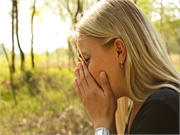- Could Your Grocery Store Meat Be Causing Recurring UTIs?
- Are You Making This Expensive Thermostat Error This Winter?
- Recognizing the Signs of Hypothyroidism
- 10 Strategies to Overcome Insomnia
- Could Artificial Sweeteners Be Aging the Brain Faster?
- Techniques for Soothing Your Nervous System
- Does the Water in Your House Smell Funny? Here’s Why
- Can a Daily Dose of Apple Cider Vinegar Actually Aid Weight Loss?
- 6 Health Beverages That Can Actually Spike Your Blood Sugar
- Treatment Options for Social Anxiety Disorder
Is It Allergies or COVID-19? An Expert Helps You Tell the Difference

With allergy season and the coronavirus pandemic overlapping this spring, one allergist offers some advice on how to tell which one may be making you miserable.
“This spring allergy season has been especially challenging because of the pandemic of COVID-19, and a lot of my patients, and a lot of allergy sufferers, can have a hard time distinguishing between what is an allergy and what are symptoms of COVID-19,” said Dr. Rachna Shah, an allergist at Loyola Medicine in Maywood, Ill.
Typical symptoms of seasonal allergies include itchy eyes, itchy nose, sneezing, runny nose and post-nasal drip. Symptoms of COVID-19 include fever, cough, shortness of breath, fatigue, muscle aches, diarrhea and, sometimes, a sore throat.
“The big differentiating factor between allergies and COVID-19 are those itchy symptoms — itchy eyes, itchy nose and sneezing. If you are experiencing these, they are most likely due to environmental allergies and not COVID-19,” Shah said in a Loyola news release.
Many people with allergies also suffer from asthma.
“Asthma can also make you more susceptible to having more severe symptoms of COVID-19,” Shah said. “So, it is really important to have an up-to-date action plan for both your allergies and for your asthma.”
Shah noted that often, “when people are feeling well, they will become more lax about following their treatment plans.”
Patients must be “vigilant” in taking all medications as prescribed and having additional inhalers and refills, Shah urged.
To minimize spring allergy symptoms, try to avoid allergens. For example, keep windows closed, and rinse off or change clothes after being outside.
Many of the current restrictions for preventing the spread of the coronavirus — such as staying at home — can also help minimize allergy and asthma symptoms this spring, according to Shah.
More information
AARP has more on seasonal allergies versus COVID-19 symptoms.
Source: HealthDay
Copyright © 2026 HealthDay. All rights reserved.










